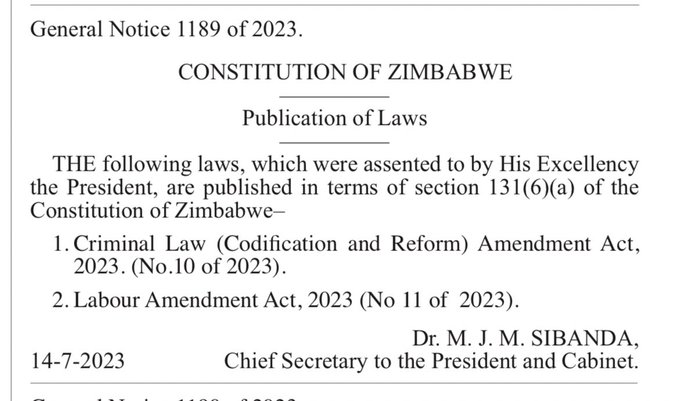President Emmerson Mnangagwa has signed the Criminal Law (Codification and Reform) Act, often known as the “Patriotic Bill,” into law, which, according to human rights defenders, would most likely be used to ‘severely’ punish anyone who advocates for sanctions or foreign interference in Zimbabwe.
This development comes amid protests from human rights advocates and civil society organisations that the act will violate constitutional rights to free expression and association by criminalising and punishing citizens who publicly criticise the government.
Read: ‘Patriotic Bill will be used to punish citizens’ – #Asakhe – CITE
President Mnangagwa signed the Criminal Law (Codification and Reform) Act, 2023 (No. 10 of 2023) alongside the Labour Amendment Act, 2023 (No. 11 of 2023) this Friday, July 14, 2023.
The notice 1189 of 2023 was published by Chief Secretary to the President and Cabinet, Dr Misheck Sibanda.

Gazetted on December 23, 2022, the bill sought to amend the Criminal Law (Codification and Reform) Act [Chapter 9:23], has four clauses, three of which have been described as progressive excluding the controversial Patriotic section in Clause 2.
The Zanu PF-dominated parliament passed the Criminal Law (Codification and Reform) Amendment Bill in June while the Senate followed suit a week later in the same month.
The ‘Patriotic section’ under Clause 2 of the now Act has been widely condemned by civic society organisations and human rights defenders for shrinking Zimbabwe’s democratic space and undermining the country’s constitution, which was adopted in 2013.
This is due to the disputed Patriotic provision in the Criminal Law (Codification and Reform) Amendment Bill, which makes it unlawful for people to speak negatively about the country or mingle with foreign diplomats or other foreigners addressing such matters.
Critics have accused Zanu PF of “smuggling” Clause 2 on Patriotism into the Criminal Law (Codification and Reform) Amendment Bill, which was gazetted on December 23, 2022, of attempting to legislate patriotism because the bill as a whole seeks to amend the Criminal Law (Codification and Reform) Act [Chapter 9:23], which contains three other clauses that have been described as progressive steps.
The other three clauses include Clause 3 will amend Section 65 of the Principal Act to make 15 years the minimum required punishment for rape, in response to the rise in horrendous crimes of sexual violence and rape.
Clause 4 proposes to amend Section 155 of the main Act’s definition of dangerous drugs to include prepared opium, prepared cannabis resin, and a drug schedule.
It also includes a description of industrial hemp, as Zimbabwe is dealing with a significant drug problem.
Clause 5 proposes to amend Section 174 of the main Act as the existing definition of criminal abuse of office, as provided for in Section 174 (i), is fairly broad, allowing public officials to be charged for honest mistakes made while doing their duties.
As a result, the amendment will narrow the offence to include the essential elements of a public official’s knowledge that his or her behaviour was illegal.
Read: ‘Patriotic Bill’ poses a major threat to journalism – #Asakhe – CITE

